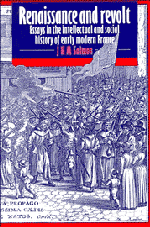Book contents
- Frontmatter
- Contents
- Acknowledgements
- Introduction
- Part I Humanism, stoicism, and interest of state
- Part II Sovereignty, resistance, and Christian obedience
- Part III Structures and fissures
- 8 Venality of office and popular sedition in seventeenth-century France
- 9 Peasant revolt in Vivarais, 1575–1580
- 10 The Paris Sixteen, 1584–1594: the social analysis of a revolutionary movement
- 11 The Audijos revolt: provincial liberties and institutional rivalries under Louis XIV
- Index
9 - Peasant revolt in Vivarais, 1575–1580
Published online by Cambridge University Press: 23 December 2009
- Frontmatter
- Contents
- Acknowledgements
- Introduction
- Part I Humanism, stoicism, and interest of state
- Part II Sovereignty, resistance, and Christian obedience
- Part III Structures and fissures
- 8 Venality of office and popular sedition in seventeenth-century France
- 9 Peasant revolt in Vivarais, 1575–1580
- 10 The Paris Sixteen, 1584–1594: the social analysis of a revolutionary movement
- 11 The Audijos revolt: provincial liberties and institutional rivalries under Louis XIV
- Index
Summary
Since the beginning of the controversy between Boris Porshnev and Roland Mousnier a generation ago, studies of popular revolts and affrays have been centred in the seventeenth century. Even when they have begun by questioning Mousnier's general conclusions, nearly all these studies have ended by reaffirming them. Resistance to the agents of royal taxation was the dominant motif, and local solidarity between the social orders against the centralising state was more evident than the hostility of the labouring classes towards their betters. But there has been too great a readiness to apply the seventeenthcentury model to the risings of the later sixteenth century. In his popular overview of peasant revolt in both periods (and indeed beyond), Yves-Marie Bercé has taken the great Pitaud (or Pétault) revolt of 1548 as establishing a pattern which was to repeat itself continuously with one or two variations and exceptions.
Two other recent surveys have modified the set image and given more attention to the peasant risings of the religious wars. In the long term Jean Jacquart finds the exploitative power of the seigneurial apparatus and the growth of peasant indebtedness to urban interests to be at least as disruptive of peasant political economy as state taxation. Distinguishing the risings of the later sixteenth century from those that followed, he attaches importance to warbands, seigneurial and church dues, and resentment of country against town as primary causes of peasant discontents. In contrast with Bercé, Jacquart stresses evidence for antiseigneurial motives in the Croquant movement of the 1590s, which he calls the most consciously revolutionary of all the revolts.
- Type
- Chapter
- Information
- Renaissance and RevoltEssays in the Intellectual and Social History of Early Modern France, pp. 211 - 234Publisher: Cambridge University PressPrint publication year: 1987



